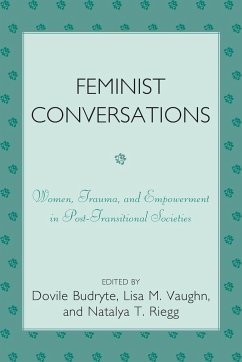Feminist Conversations
Women, Trauma and Empowerment in Post-Transitional Societies
Herausgeber: Budryte, Dovile; Riegg, Natalya T.; Vaughn, Lisa M.
Feminist Conversations
Women, Trauma and Empowerment in Post-Transitional Societies
Herausgeber: Budryte, Dovile; Riegg, Natalya T.; Vaughn, Lisa M.
- Broschiertes Buch
- Merkliste
- Auf die Merkliste
- Bewerten Bewerten
- Teilen
- Produkt teilen
- Produkterinnerung
- Produkterinnerung
This book offers a wealth of knowledge about addressing women's social and political issues and discusses some of the most striking examples of democratization. Women across all cultural lines will feel empowered to re-ignite our movement towards an egalitarian society transcending all boundaries and barriers.-T. V. Means, Ph.D.
Andere Kunden interessierten sich auch für
![Conversations with Feminism Conversations with Feminism]() Penny A. WeissConversations with Feminism57,99 €
Penny A. WeissConversations with Feminism57,99 €![Conversations with My Younger Self Conversations with My Younger Self]() Arlene BiceConversations with My Younger Self16,99 €
Arlene BiceConversations with My Younger Self16,99 €![Conversations with Manuel Castells Conversations with Manuel Castells]() Manuel CastellsConversations with Manuel Castells81,99 €
Manuel CastellsConversations with Manuel Castells81,99 €![Progressive Conversations Progressive Conversations]() Roger L. RayProgressive Conversations25,99 €
Roger L. RayProgressive Conversations25,99 €![Conversations with Anthony Giddens Conversations with Anthony Giddens]() Anthony GiddensConversations with Anthony Giddens27,99 €
Anthony GiddensConversations with Anthony Giddens27,99 €![Contemporary Conversations on Immigration in the United States Contemporary Conversations on Immigration in the United States]() Judith Noemí FreidenbergContemporary Conversations on Immigration in the United States63,99 €
Judith Noemí FreidenbergContemporary Conversations on Immigration in the United States63,99 €![Transatlantic Conversations Transatlantic Conversations]() Mary EvansTransatlantic Conversations77,99 €
Mary EvansTransatlantic Conversations77,99 €-
-
-
This book offers a wealth of knowledge about addressing women's social and political issues and discusses some of the most striking examples of democratization. Women across all cultural lines will feel empowered to re-ignite our movement towards an egalitarian society transcending all boundaries and barriers.-T. V. Means, Ph.D.
Hinweis: Dieser Artikel kann nur an eine deutsche Lieferadresse ausgeliefert werden.
Hinweis: Dieser Artikel kann nur an eine deutsche Lieferadresse ausgeliefert werden.
Produktdetails
- Produktdetails
- Verlag: University Press of America
- Seitenzahl: 190
- Erscheinungstermin: 5. November 2008
- Englisch
- Abmessung: 229mm x 152mm x 10mm
- Gewicht: 284g
- ISBN-13: 9780761843795
- ISBN-10: 0761843795
- Artikelnr.: 25467529
- Herstellerkennzeichnung
- Libri GmbH
- Europaallee 1
- 36244 Bad Hersfeld
- gpsr@libri.de
- Verlag: University Press of America
- Seitenzahl: 190
- Erscheinungstermin: 5. November 2008
- Englisch
- Abmessung: 229mm x 152mm x 10mm
- Gewicht: 284g
- ISBN-13: 9780761843795
- ISBN-10: 0761843795
- Artikelnr.: 25467529
- Herstellerkennzeichnung
- Libri GmbH
- Europaallee 1
- 36244 Bad Hersfeld
- gpsr@libri.de
Dovile Budryte is an Associate Professor of Political Science at Georgia Gwinnett College in Lawrenceville, Georgia. Her research interests include gender studies, nationalism and democratization. She wrote Taming Nationalism? Political Community Building in the Post-Soviet Baltic States (Ashgate, 2005) and numerous articles about minority rights and collective memory in the Baltic states. Lisa M. Vaughn is an Associate Professor of Pediatrics at the University of Cincinnati, College of Medicine and Cincinnati Children's Hospital Medical Center in Ohio. Her primary research interests are socio-cultural issues affecting the health and well-being of families, especially immigrant and minority populations in the United States. With a life-long interest in other cultures, Lisa has worked with universities and communities around the world, including Guatemala, South Africa, Denmark and the Dominican Republic. Natalya T. Riegg is a Professor of Political Science and Global Studies at the University of Saint Mary in Leavenworth, Kansas. Her fields of specialization include political philosophy, cross-cultural communication and international women's issues. She is the author of dozens of articles and a book, The Social Philosophy of Alvin Toffler (in Russian).
Part 1 Part I. Reflecting on Trauma and Empowerment: Theories and Practices
Chapter 2 Chapter 1. Revision of the Visions: Feminism and Empowerment in
Post-Transitional Societies Chapter 3 Chapter 2. From "Dirty Laundry" to a
Human Rights Concern? International Norms and Gender Violence in Armenia
and Lithuania Chapter 4 Chapter 3. Paradoxes of "Gender Equality" in
Lithuania: Violence against Women and Equal Opportunites Chapter 5 Chapter
4. "Come Rape Us!" The Everyday Trauma of Sexual Violence in South Africa
Chapter 6 Chapter 5. Losing Ground: How the Lack of Opportunity for Women
to Own Land Impales the Tanzanian Economy Chapter 7 Chapter 6.
Entrepreneurship: Antidote to Women's Economic Oppression Part 8 Part II.
Living Trauma and Empowerment: Stories and Strategies Chapter 9 Chapter 7.
Left Alone, the Widows of the War: Trauma Reframed through Community
Empowerment in Guatemala Chapter 10 Chapter 8. Dolls with Jobs: A
Compelling Response by Traditional KwaZulu-Natal Craftswomen in an Era of
HIV-AIDS Chapter 11 Chapter 9. Confined Space:The Simultaneous Installation
of Art and the De-Installation of a Relationship Part 12 Part III.
Authentic Voices: Nothing Lost in Translation! Chapter 13 Chapter 10. Were
All Women Born to Suffer? Understanding Resistance to Empowerment: A
Lithuanian NGO Activist's Perspective Chapter 14 Chapter 11. Women and
Empowerment in Armenia: Traditions, Transitions and Current Politics
Chapter 15 Chapter 12. Zara's Travail: A Life Story Chapter 16 Chapter 13.
Gender In/Equality in Egypt and Armenia Chapter 17 Chapter 14. Addressing
Trauma through Political Action: Nineth Montenegro's Story Chapter 18
Conclusion: A Conversation among the Editors
Chapter 2 Chapter 1. Revision of the Visions: Feminism and Empowerment in
Post-Transitional Societies Chapter 3 Chapter 2. From "Dirty Laundry" to a
Human Rights Concern? International Norms and Gender Violence in Armenia
and Lithuania Chapter 4 Chapter 3. Paradoxes of "Gender Equality" in
Lithuania: Violence against Women and Equal Opportunites Chapter 5 Chapter
4. "Come Rape Us!" The Everyday Trauma of Sexual Violence in South Africa
Chapter 6 Chapter 5. Losing Ground: How the Lack of Opportunity for Women
to Own Land Impales the Tanzanian Economy Chapter 7 Chapter 6.
Entrepreneurship: Antidote to Women's Economic Oppression Part 8 Part II.
Living Trauma and Empowerment: Stories and Strategies Chapter 9 Chapter 7.
Left Alone, the Widows of the War: Trauma Reframed through Community
Empowerment in Guatemala Chapter 10 Chapter 8. Dolls with Jobs: A
Compelling Response by Traditional KwaZulu-Natal Craftswomen in an Era of
HIV-AIDS Chapter 11 Chapter 9. Confined Space:The Simultaneous Installation
of Art and the De-Installation of a Relationship Part 12 Part III.
Authentic Voices: Nothing Lost in Translation! Chapter 13 Chapter 10. Were
All Women Born to Suffer? Understanding Resistance to Empowerment: A
Lithuanian NGO Activist's Perspective Chapter 14 Chapter 11. Women and
Empowerment in Armenia: Traditions, Transitions and Current Politics
Chapter 15 Chapter 12. Zara's Travail: A Life Story Chapter 16 Chapter 13.
Gender In/Equality in Egypt and Armenia Chapter 17 Chapter 14. Addressing
Trauma through Political Action: Nineth Montenegro's Story Chapter 18
Conclusion: A Conversation among the Editors
Part 1 Part I. Reflecting on Trauma and Empowerment: Theories and Practices
Chapter 2 Chapter 1. Revision of the Visions: Feminism and Empowerment in
Post-Transitional Societies Chapter 3 Chapter 2. From "Dirty Laundry" to a
Human Rights Concern? International Norms and Gender Violence in Armenia
and Lithuania Chapter 4 Chapter 3. Paradoxes of "Gender Equality" in
Lithuania: Violence against Women and Equal Opportunites Chapter 5 Chapter
4. "Come Rape Us!" The Everyday Trauma of Sexual Violence in South Africa
Chapter 6 Chapter 5. Losing Ground: How the Lack of Opportunity for Women
to Own Land Impales the Tanzanian Economy Chapter 7 Chapter 6.
Entrepreneurship: Antidote to Women's Economic Oppression Part 8 Part II.
Living Trauma and Empowerment: Stories and Strategies Chapter 9 Chapter 7.
Left Alone, the Widows of the War: Trauma Reframed through Community
Empowerment in Guatemala Chapter 10 Chapter 8. Dolls with Jobs: A
Compelling Response by Traditional KwaZulu-Natal Craftswomen in an Era of
HIV-AIDS Chapter 11 Chapter 9. Confined Space:The Simultaneous Installation
of Art and the De-Installation of a Relationship Part 12 Part III.
Authentic Voices: Nothing Lost in Translation! Chapter 13 Chapter 10. Were
All Women Born to Suffer? Understanding Resistance to Empowerment: A
Lithuanian NGO Activist's Perspective Chapter 14 Chapter 11. Women and
Empowerment in Armenia: Traditions, Transitions and Current Politics
Chapter 15 Chapter 12. Zara's Travail: A Life Story Chapter 16 Chapter 13.
Gender In/Equality in Egypt and Armenia Chapter 17 Chapter 14. Addressing
Trauma through Political Action: Nineth Montenegro's Story Chapter 18
Conclusion: A Conversation among the Editors
Chapter 2 Chapter 1. Revision of the Visions: Feminism and Empowerment in
Post-Transitional Societies Chapter 3 Chapter 2. From "Dirty Laundry" to a
Human Rights Concern? International Norms and Gender Violence in Armenia
and Lithuania Chapter 4 Chapter 3. Paradoxes of "Gender Equality" in
Lithuania: Violence against Women and Equal Opportunites Chapter 5 Chapter
4. "Come Rape Us!" The Everyday Trauma of Sexual Violence in South Africa
Chapter 6 Chapter 5. Losing Ground: How the Lack of Opportunity for Women
to Own Land Impales the Tanzanian Economy Chapter 7 Chapter 6.
Entrepreneurship: Antidote to Women's Economic Oppression Part 8 Part II.
Living Trauma and Empowerment: Stories and Strategies Chapter 9 Chapter 7.
Left Alone, the Widows of the War: Trauma Reframed through Community
Empowerment in Guatemala Chapter 10 Chapter 8. Dolls with Jobs: A
Compelling Response by Traditional KwaZulu-Natal Craftswomen in an Era of
HIV-AIDS Chapter 11 Chapter 9. Confined Space:The Simultaneous Installation
of Art and the De-Installation of a Relationship Part 12 Part III.
Authentic Voices: Nothing Lost in Translation! Chapter 13 Chapter 10. Were
All Women Born to Suffer? Understanding Resistance to Empowerment: A
Lithuanian NGO Activist's Perspective Chapter 14 Chapter 11. Women and
Empowerment in Armenia: Traditions, Transitions and Current Politics
Chapter 15 Chapter 12. Zara's Travail: A Life Story Chapter 16 Chapter 13.
Gender In/Equality in Egypt and Armenia Chapter 17 Chapter 14. Addressing
Trauma through Political Action: Nineth Montenegro's Story Chapter 18
Conclusion: A Conversation among the Editors








